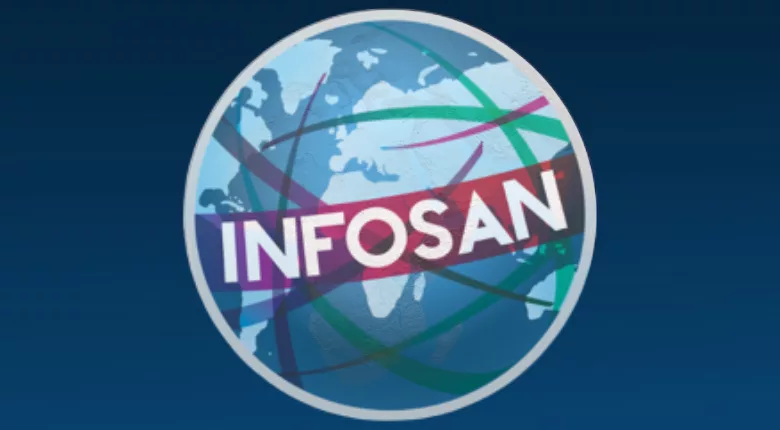INFOSAN Responded to Most Ever Food Safety Incidents in 2020–2021, Doubled from 2018–2019

Image credit: INFOSAN
According to the recently released 2020–2021 Activity Report for the International Food Safety Authorities Network (INFOSAN), the INFOSAN Secretariat responded to 375 international food safety events, which is nearly double the number of incidents in 2018–2019 (162) and the highest number since the network was established in 2004. INFOSAN was established by the Food and Agriculture Organization of the United Nations (FAO) and the World Health Organization (WHO) for the purpose of connecting authorities in different countries to strengthen national and international food safety systems.
The role of the INFOSAN Secretariat during food safety events is to facilitate communication between FAO/WHO Member States and encourage information-sharing about essential details of implicated products and their distribution, helping to identify the sources of foodborne illness outbreaks in a timely manner. The increase in responses by the INFOSAN Secretariat to food safety events in 2020–2021 could be attributed to the increased awareness of food safety risks, capacity-building activities delivered by the INFOSAN Secretariat, increased reporting of food safety issues, webinars and workshops with FAO and WHO Member States, increased capacity of the INFOSAN Secretariat, and stronger collaboration with key partners. Additionally, the COVID-19 pandemic, which was at its height during the reporting period, provided motivation for Member States to strengthen food safety systems, including international and cross-sector collaboration for emergency response and risk communication, to ensure the safety of food distributed internationally.
Like in 2018–2019, biological hazards were the most significant cause of food safety events in 2020–2021, accounting for 57 percent (212 of 375) of incidents. Undeclared allergen, physical, and chemical hazards followed, accounting for 17 percent, 13 percent, and 11 percent of food safety events, respectively. The remaining incidents were caused by an unknown hazard.
Salmonella was the most common cause of biological food safety events, responsible for 41 percent of incidents, followed by Listeria monocytogenes (25 percent), Escherichia coli (8 percent), and Clostridium (7 percent). The most implicated food categories were fish and other seafood (17 percent), followed by milk and dairy products (10 percent), meat and meat products (10 percent), and snacks and desserts (9 percent). Noting that multiple regions are often involved in the same events, the majority of the 375 events involved Member States in the European Region (68 percent), followed by the Western Pacific Region (27 percent), the Region of the Americas (27 percent), the African Region (23 percent), the Eastern Mediterranean Region (16 percent), and the Southeast Asia Region (9 percent).
The 2020–2021 Activity Report highlights two major outbreaks that the INFOSAN Secretariat was involved in linked to the consumption of enoki mushrooms from the Republic of Korea in 2020 and Galia melons from Honduras in 2021. During these incidents, INFOSAN facilitated international collaboration between the affected countries to identify the sources of the outbreaks, share investigation information, and implement risk mitigation measures.
Also mentioned in the Activity Report are other initiatives undertaken by INFOSAN in 2020–2021. Specifically, the INFOSAN Secretariat conducted workshops for six countries (Kuwait, Guyana, Morocco, Cameroon, Senegal, and Bhutan) to strengthen their national capacities; collaborated with FAO/WHO Food Safety Regional Advisors to organize and conduct Regional Meetings for INFOSAN members in the African Region, the Region of the Americas, and the Asia-Pacific Region; and participated in World Food Safety Day in 2020 and 2021 through activities and webinars.
Additionally, due to increased requests for country workshops, webinars, and trainings from Member States, the INFOSAN Secretariat launched a “Train-the-Trainer” program with the support of the Canadian Food Inspection Agency (CFIA), through which INFOSAN Ambassadors are selected and educated on how to support the work of INFOSAN during workshops and trainings. The program selected 12 Ambassadors from 12 different countries and trained them on topics like INFOSAN roles and responsibilities, international foodborne illness outbreak investigations, and food safety emergency response.
Looking for quick answers on food safety topics?
Try Ask FSM, our new smart AI search tool.
Ask FSM →









